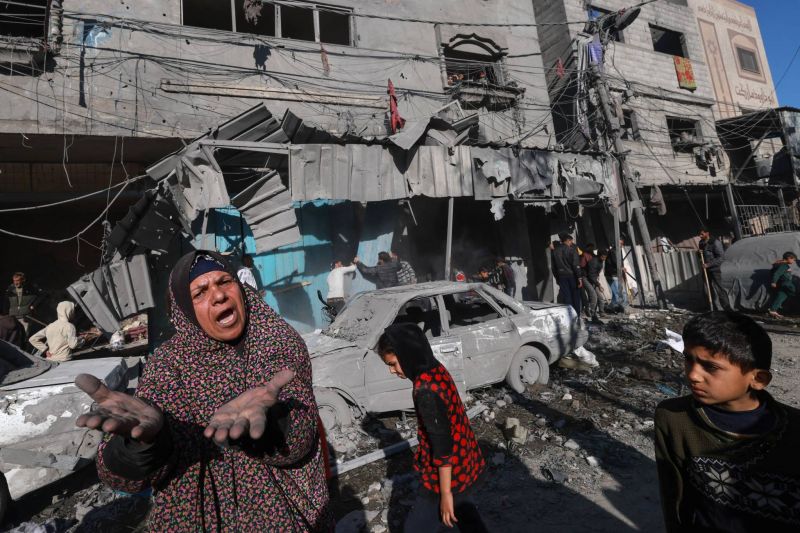
A Palestinian woman gestures near debris and destroyed vehicles on Feb. 22, 2024, following an overnight Israeli air strike in Rafah refugee camp in the southern Gaza Strip, as battles between Israel and the Palestinian militant group Hamas continue. (Credit: Mohammed Abed/AFP)
Israel launched air strikes Thursday on southern Gaza's Rafah after threatening to send troops against Hamas militants in the city where around 1.4 million Palestinians have sought refuge.
Global powers trying to find a way to end the Israel-Hamas war have so far failed, but a US envoy was expected in Israel on Thursday in the latest attempt to secure a truce deal.
The war has also triggered mounting violence in the occupied West Bank, where three Palestinian gunmen opened fire Thursday on cars in a highway traffic jam, killing one and wounding eight including a young pregnant woman.
The attackers were shot dead at the scene, near a Jewish settlement east of Jerusalem. Israeli far-right politicians quickly called for more citizens to carry weapons and for even greater restrictions on Palestinian West Bank residents.
International concern has spiraled over Gaza's high civilian death toll and the dire humanitarian crisis sparked by the war that followed Hamas's Oct. 7 attack against Israel.
More than four months of relentless fighting and bombardment have flattened much of the coastal territory and pushed its population of around 2.4 million to the brink of famine, according to the UN.
The alarm has centered on Gaza's southernmost city of Rafah, where more than 1.4 million people are now living in crowded shelters and makeshift tents where disease threatens.
Israel has warned that, if Hamas does not free the remaining hostages held in Gaza by the start of Ramadan, it will keep fighting during the Muslim holy month, including in Rafah.
Israel has already been bombing targets in Rafah, which was again hit overnight and where early Thursday AFP reporters heard multiple air strikes.
"I woke up to the sound of a huge explosion like an earthquake – fire, smoke, blasts and dust everywhere," said Rami al-Shaer, 21, who said he and others pulled wounded family members from the rubble.
He charged that Israel "doesn't care" about the ongoing cease-fire talks and rather "wants to displace the people from Rafah and are preparing for a ground attack."
Gaza's Civil Defence agency reported "a number of martyrs" there, while elsewhere in Rafah residents walked among the rubble of the city's al-Faruq mosque, after strikes.
Mosque hit
The Oct. 7 attack resulted in the deaths of about 1,160 people in Israel, mostly civilians, according to an AFP tally of official Israeli figures.
Hamas militants also took about 250 Israeli and foreign hostages – 130 of whom remain in Gaza, including 30 presumed dead, according to Israel.
Israel's retaliatory campaign has killed at least 29,410 people, mostly women and children, according to the latest count by Gaza's health ministry.
War cabinet member Benny Gantz said Israel's operation in Rafah would begin "after the evacuation of the population," although his government has not specified where civilians could go in devastated Gaza.
Gazans have repeatedly said nowhere is safe, and the health ministry said Thursday that 97 people had been killed across the Palestinian territory over the previous day.
Mediators including the United States, Qatar and Egypt have tried to negotiate a ceasefire and hostage release deal.
Brett McGurk, White House coordinator for the Middle East and North Africa, was expected in Israel for his second regional stop after Egypt.
Hamas's chief Ismail Haniyeh was in Cairo for talks as well, according to the group.
Israel's Gantz said there were efforts to "promote a new plan for the return of the hostages," adding that "we are seeing the first signs that indicate the possibility of progress in this direction."
US State Department spokesman Matthew Miller said Washington hopes for an "agreement that secures a temporary cease-fire where we can get the hostages out and get humanitarian assistance."
Israeli Prime Minister Benjamin Netanyahu has insisted the army will keep fighting until it has destroyed Hamas and freed the remaining hostages.
Netanyahu's failure to bring home all the captives has led to mounting protests and calls for early elections.
A poll of hundreds of Israelis, published Wednesday, showed a majority do not think "absolute victory" is a likely outcome.
The United States, Arab states and others have also called for a pathway to a Palestinian state.
Israel's parliament overwhelmingly backed a proposal by Netanyahu to oppose any unilateral recognition of a Palestinian state.
Vessel on fire
The UN humanitarian agency OCHA said humanitarian assistance to Gaza is being gravely hampered by the "intense hostilities, limitations on the entry and delivery of aid, and growing insecurity."
In the southern Gaza city of Khan Younis, medical charity Doctors Without Borders (MSF) said an Israeli tank had fired on a house sheltering their employees and families.
Two relatives of MSF staff were killed and six others injured, it said, condemning the strike in the "strongest possible terms."
When contacted by AFP, the Israeli army said its forces had "fired at a building" where "terror activity is occurring," adding that it "regrets" harm to civilians.
Troops killed more than 15 militants in western Khan Younis over the previous day, the military said on Thursday.
Israel has repeatedly said Hamas militants use civilian infrastructure including hospitals as operational bases. Hamas has denied this.
Elsewhere in the region, the war has led to attacks by Yemen's Iran-backed Houthi rebels in the Red Sea shipping area vital for global trade.
The Houthis say they are acting in solidarity with Palestinians.
A missile attack Thursday targeted a vessel transiting the Gulf of Aden, causing a fire on board, two maritime agencies said.
Israel's military also said air defenses successfully intercepted an airborne threat identified "in the area of the Red Sea."